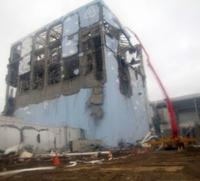-
ETrade cyberattack shuts down trading
Over the holiday season, Australia’s second-largest online brokering service, ANZ Bank’s ETrade was hit by a series of cyberattacks, temporarily locking out customers
-
-
Depleted gas reservoirs used for carbon storage

One way to keep CO2 from accumulating in the atmosphere is to bury (or “sequester”) it under ground; a demonstration project in Australia verified that depleted natural gas reservoirs can be used for geologic carbon sequestration; the carbon sequestration approach involves pumping CO2 deep underground for permanent storages
-
-
Japanese government, Tokyo Electric blasted for handling of Fukushima

A recent report revealed that Japan’s response to the nuclear crises at the Fukushima Daiichi atomic energy plant following the devastating 11 March earthquake and tsunami was riddled with false assumptions, miscommunication, and poor planning
-
-
Connecticut examines ways to bolster electrical grid during disasters –
Following Tropical Storm Irene and the29 October nor’easter that left thousands of homes without power across the northeast, Connecticut is considering new regulations that could bolster the power grid and improve resiliency during natural disasters
-
-
California’s flood-protection system crumbling

California has a patchwork of aging flood-protection system; it was built over the last 150 years by individuals, localities, and the state government; experts say this system, now protecting an estimated $69 billion in assets, is woefully inadequate
-
-
Using bacteria to detect toxins in water
Biologists and bioengineers at UC San Diego have created a living neon sign composed of millions of bacterial cells that periodically fluoresce in unison like blinking light bulbs; because bacteria are sensitive to many kinds of environmental pollutants and organisms, the scientists believe this approach could be used to design low cost bacterial biosensors capable of detecting an array of heavy metal pollutants and disease-causing organisms
-
-
SF Bay wetlands losing battle against sea level rise

San Francisco Bay’s tidal marshes protect coastlines against flooding, provide nursery areas for commercial fisheries and filter pollutants from seawater and the atmosphere; these marshes may face a grave threat from sea level rise in the next century
-
-
Cleaning toxins from the oilsands
Oilsands development uses a vast amount of water and even though it’s recycled multiple times, the recycling concentrates the toxins and metals leftover from extracting and upgrading the bitumen, resulting in controversial tailings ponds that are a significant risk to the environment; scientists offer a way to make oilsands exploitation cleaner
-
-
California lawmakers work to improve utilities’ disaster preparedness
California lawmakers are considering a bill to better prepare public utilities for emergencies and disasters following a series of severe storms that left thousands without power across the state
-
-
Wireless sensors effective in protecting critical infrastructure
A key to critical infrastructure security is effective monitoring of such infrastructure; a European research project has now successfully demonstrated a wireless sensor-based solution for cost-effective monitoring of electricity distribution networks and water networks
-
-
Sustaining high-quality groundwater
Intensive agriculture practices developed during the past century have helped improve food security for many people but have also added to nitrate pollution in surface and ground waters
-
-
Predators may have contributed to 2007 Wall Street collapse
A new study retraces events to show that at a critical point in the financial crisis, the stock of Citigroup was attacked by traders by selling borrowed stock (short-selling) which may have caused others to sell in panic; the subsequent price drop enabled the attackers to buy the stock back at a much lower price
-
-
Fukushima reaches cold shutdown conditions, critics scoff

Last week Japanese officials declared that the beleaguered Fukushima Daiichi power plant had become stable enough for engineers to complete a “cold shutdown”; officials also stated that the facility had ceased to leak substantial amounts of radiation, a claim received skeptically by critics
-
-
Innovative device removes heavy metals from water

Engineers at Brown University have developed a system that cleanly and efficiently removes trace heavy metals from water; in experiments, the researchers showed the system reduced cadmium, copper, and nickel concentrations, returning contaminated water to near or below federally acceptable standards; the technique is scalable and has viable commercial applications, especially in the environmental remediation and metal recovery fields
-
-
Building earthquake-proof buildings
Researchers in Australia are leading an international project to help identify buildings most vulnerable to earthquakes and the best ways to strengthen them
-
More headlines
The long view
Water Wars: A Historic Agreement Between Mexico and US Is Ramping Up Border Tension
As climate change drives rising temperatures and changes in rainfall, Mexico and the US are in the middle of a conflict over water, putting an additional strain on their relationship. Partly due to constant droughts, Mexico has struggled to maintain its water deliveries for much of the last 25 years, deliveries to which it is obligated by a 1944 water-sharing agreement between the two countries.
Trump Is Fast-Tracking New Coal Mines — Even When They Don’t Make Economic Sense
In Appalachian Tennessee, mines shut down and couldn’t pay their debts. Now a new one is opening under the guise of an “energy emergency.”
Smaller Nuclear Reactors Spark Renewed Interest in a Once-Shunned Energy Source
In the past two years, half the states have taken action to promote nuclear power, from creating nuclear task forces to integrating nuclear into long-term energy plans.
Keeping the Lights on with Nuclear Waste: Radiochemistry Transforms Nuclear Waste into Strategic Materials
How UNLV radiochemistry is pioneering the future of energy in the Southwest by salvaging strategic materials from nuclear dumps –and making it safe.
Model Predicts Long-Term Effects of Nuclear Waste on Underground Disposal Systems
The simulations matched results from an underground lab experiment in Switzerland, suggesting modeling could be used to validate the safety of nuclear disposal sites.
